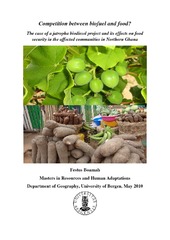Competition between biofuel and food? The case of a jatropha biodiesel project and its effects on food security in the affected communities in Northern Ghana
Master thesis
Permanent lenke
https://hdl.handle.net/1956/7351Utgivelsesdato
2010-05-18Metadata
Vis full innførselSamlinger
- Department of Geography [676]
Sammendrag
Biofuels have become an issue of much concern to policy makers, national governments and the international agencies amid discussions on climate change. Debates and discussions about the implications of biofuels are underpinned by the managerial and populist discourses that offer policy directions to address climates change issues in the 21st century. In Ghana, opponents of biofuels adhere to the populist discourses to describe daunting implications of biofuels on local environmental resources and livelihoods whereas proponents adhere to managerial discourses to express optimism in biofuels as the means to mitigate the impacts of climate change through technology transfer and local improved livelihoods. The examines the food security implications of jatropha biodiesel project by BioFuel Africa Ltd. in the Central Gonja and Yendi Districts of Northern Ghana. The project aims to produce jatropha biodiesel both for use in Ghana as well as for export and also contribute to improved livelihoods and food security in the affected communities in Northern Ghana. This study examines the effects of the jatropha project on the food security of households in three villages in Yendi district, whose livelihoods depend on cultivating food crops on the lands earmarked for the project. The study found that the jatropha project improved household food security through employment creation, improved petty trading as well as increased food production on an otherwise abandoned farmland. However, the global economic crunch coupled with negative publications by interests groups in Ghana led to loss of funding sources for the company and the subsequent layoff of almost the entire workers. The evidence presented shows that, the discourses underpinning biofuel debates are expressed by the use of narratives. The narratives within the discourses are re-told by constructing a more nuanced knowledge on biofuels and food security by bringing to the spotlight a wide range of different context-specific cases of biofuel investments and the conditions under which biofuels influence food security. It is then argued that, the extent of competition between biofuels and food depends on the local conditions, social responsibility and production models of biofuel investors and the type of biofuel feedstock used. These decisive factors should be given a high priority in the assessment of food security implications of biofuels, instead of adhering to discourses.
